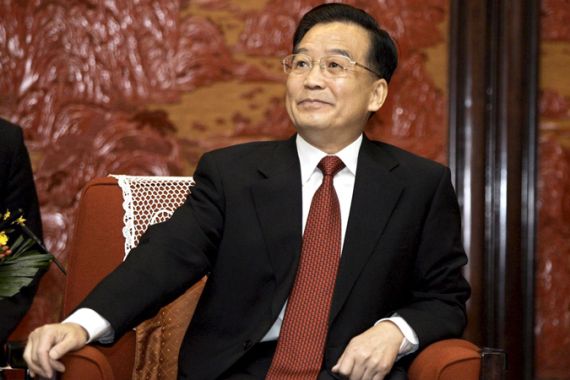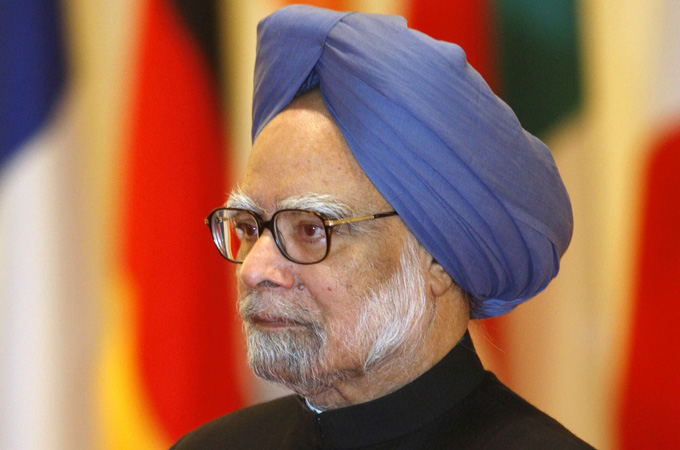Chinese PM arrives in India
Wen Jibao to discuss a series of trade and territorial issues with Manmohan Singh on a three-day state visit to India.

 |
|
Both Wen and Singh (pictured) are expected to discuss trade and territorial issues during the three-day visit [Reuters] |
Wen Jiabao, the Chinese premier, has arrived for a three-day state visit to India intended to build trust between two Asian powers with increasingly close economic ties despite ongoing competition for regional influence.
Upon his arrival on Wednesday afternoon, Wen said his visit “aimed at promoting friendship, expanding cooperation, building on our past achievements and opening up new dimensions for mutual benefit and common development of the two countries”.
He then addressed a business conference before heading to a school to discuss Chinese culture, a week after the government decided to add Mandarin to the list of languages taught at Indian schools.
The two countries are expected to discuss their lingering border disputes, a growing trade imbalance and friction over India’s role in Kashmir.
The world’s two most populous countries have worked to play down their tensions.
“We are, from the Indian side, looking at the positive side of the outcome. The trade is growing between the two countries, the people-to-people exchanges are increasing, high-level visits are also increasing,” S Krishna, India’s external affairs minister told the CNN-IBN news channel.
Both Wen and Singh, have stated that the world is “large enough” to accommodate the growth and ambition of the two Asian giants, but ties are dogged by a history of mutual suspicion and mistrust.
Growing competition for global markets and the raw materials needed to keep their fast-growing economies on the move has exacerbated tensions over border disputes, trade and the activities in India of Tibet’s exiled spiritual leader, the Dalai Lama.
‘Fragile‘
Zhang Yan, China’s ambassador to India, warned ahead of Wen’s three-day visit that relations between China and India were “fragile… easy to (damage) and difficult to repair.”
Wen, the latest world leader to beat a path to India’s door, will be accompanied by around 400 Chinese business leaders, outnumbering recent delegations headed by Barack Obama, the US president and Nicolas Sarkozy, the French president.
Annual bilateral trade currently totals close to $60bn, with India pushing hard for greater access to Chinese markets to redress a trade surplus in China’s favour estimated at between $18-$25bn.
It is expected that talks between Wen and Singh on Thursday will focus on the two countries’ disputed Himalayan border – the cause of a brief but bloody war in 1962 and the focus of 14 rounds of fruitless negotiations.
Both sides have become increasingly assertive over their territorial rights and Beijing was infuriated last year by New Delhi’s refusal to block a visit by the Dalai Lama to the northeast state of Arunachal Pradesh, which China claims in full.
The Dalai Lama, regarded as a dangerous separatist by Beijing, has lived in exile in India since fleeing a failed 1959 uprising against Chinese rule in Tibet.
Protests
Meanwhile, hundreds of Tibetan exiles marched through New Delhi on Wednesday to protest against China’s rule over Tibet.
The Tibetan Youth Congress (TYC), which organised the protests in Delhi, said it wanted to highlight China’s “occupation and oppression” of Tibet, a mountain region that has seen regular unrest against the Beijing authorities.
“The conditions of Tibetans in Tibet and the situation of political prisoners have become extremely critical,” the TYC said in a statement.
“History shows that occupation and oppression never lasts forever and until that day comes and to hasten the arrival of that day, we will keep our fight alive.”
The TYC campaigns for complete independence for Tibet, in contrast to the Dalai Lama who favours autonomy for the region under Chinese rule.
The protesters, who said they would demonstrate against Wen’s visit until the premier leaves India for Pakistan on Friday, waved flags and chanted as they marched through the Indian capital.
Harsh Pant, a lecturer in the Department of Defence Studies at King’s College in London, said tensions were inevitable in a relationship that will help define the balance of global power in the 21st century.
“A troubled history, coupled with the structural uncertainties engendered by their simultaneous rise, is propelling the two Asian giants into a trajectory that they might find rather difficult to navigate in the coming years,” Pant said.
“India-China ties have entered choppy waters and they are likely to remain there for the foreseeable future,” he added.
Wen will follow his visit with a trip to Pakistan, whose close ties with Beijing have always been viewed with suspicion by New Delhi.